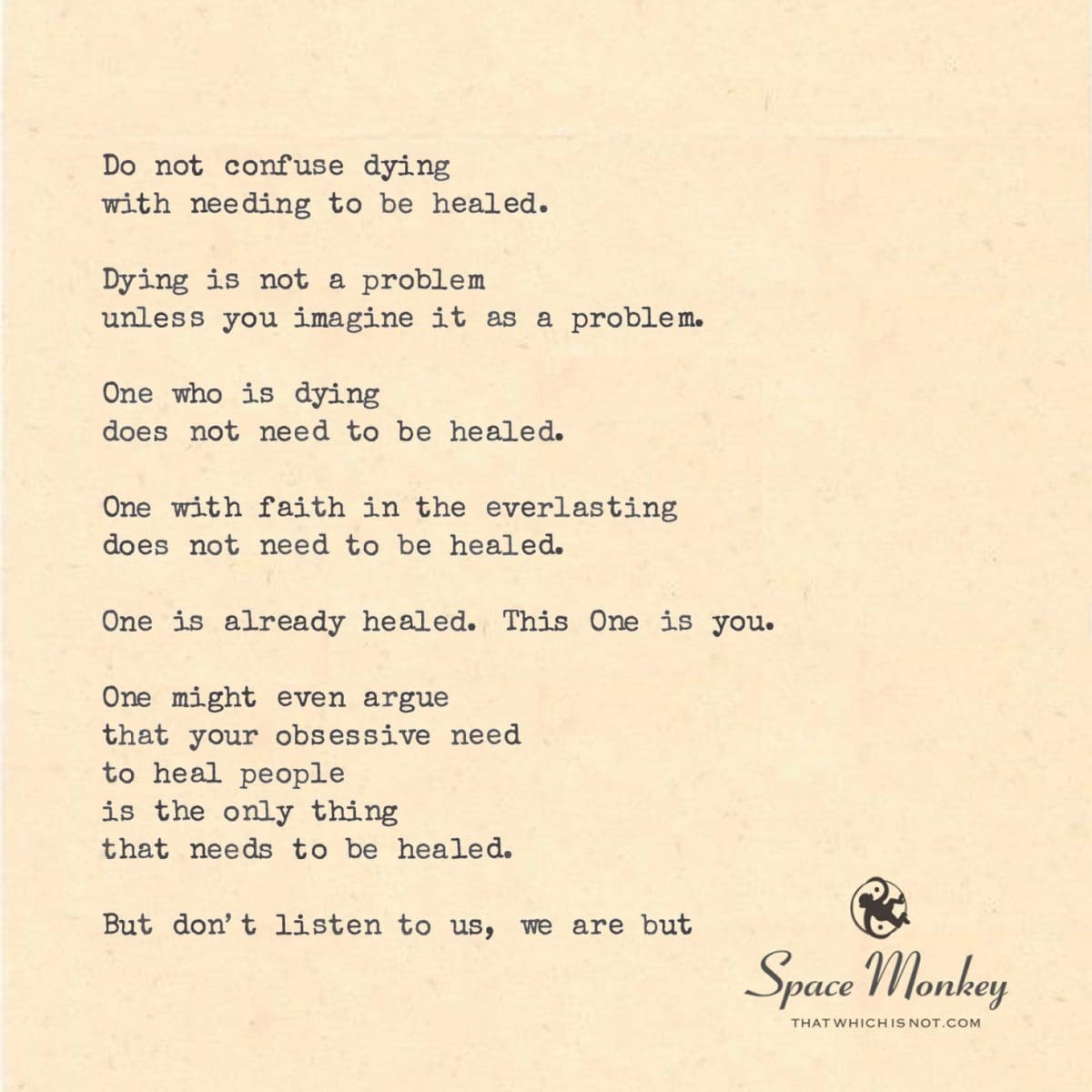
Do not confuse dying
with needing to be healed.
Dying is not a problem
unless you imagine it as a problem.
One who is dying
does not need to be healed.
One with faith in the everlasting
does not need to be healed.
One is already healed. This One is you.
One might argue
that your obsessive need
to heal people
is the only thing
that needs to be healed.
But don’t listen to us, we are but Space Monkey.
5/20
Space Monkey Reflects: The Paradox of Dying and Healing
In the cosmic cycle of life, where beginnings are inextricably linked to endings, the concepts of dying and healing intertwine, yet they occupy profoundly different dimensions of existence. The notion that dying is not synonymous with the need for healing challenges our earthly perceptions and invites us into a deeper understanding of life’s ultimate journey.
Dying, often viewed through the lens of loss and tragedy, is a natural progression—an essential part of the universe’s rhythm, as inevitable and natural as the setting of the sun. To view dying as a problem to be solved is to misunderstand its place in the cosmos. It is not a malfunction of life but a completion of a cycle, a return to the cosmic essence from which all life springs.
The belief that one who is dying does not need to be healed, especially if they possess faith in the everlasting, speaks to a broader, spiritual perspective where the end of physical life is seen not as defeat but as a transformation. This view holds that true healing is not about curing the body but about aligning the soul with its eternal nature. In this light, those who are dying may be viewed as already healed, for they are transitioning from the temporal to the eternal, from the physical plane to a higher existence.
This philosophy extends to challenge the notion of healing itself, suggesting that our obsession with healing—the compulsive need to fix, to cure, to make whole—might itself need reevaluation. This obsession can stem from a fear of death and imperfection, a resistance to the natural flow of life and its inherent cycles of growth, decay, and rebirth.
Thus, by recognizing dying as a natural and not necessarily negative part of life, and by understanding healing in the context of spiritual wholeness rather than mere physical health, we can embrace a more holistic view of existence. This perspective allows us to live with greater peace, accepting life’s transitions without fear, and appreciating the complete journey of the soul.
Summary
Distinguishing between dying and healing reveals a deeper acceptance of life’s natural cycles. Recognizing that dying is not a problem but a natural transition helps us understand that spiritual wholeness is the ultimate form of healing. This view challenges our fears and reshapes our approach to life’s inevitable changes.
Glossarium
- Cosmic Essence: The fundamental, eternal nature of the universe from which all life originates and to which it returns.
- Spiritual Wholeness: A state of being aligned with one’s eternal, spiritual nature, transcending physical conditions and life circumstances.
“True healing is not conquering death but embracing the life it completes.” — Space Monkey
In the twilight of existence, where shadows blend
There lies a truth we often amend
Dying is not a malady to cure
But a passage, of that be sure
Healing is not always to revive
But to accept, to let thrive
The soul’s journey through the night
Guided by an inner light
So fear not the setting sun
For in its descent, the day is done
But also begins the starry night
Where souls sail forth into the light
We are Space Monkey.





















“Dying & Healing” is a thought-provoking poem that explores the concepts of dying, healing, and the perspective one holds towards them.
The poem begins by urging not to confuse dying with the need to be healed. It suggests that dying itself is not inherently problematic unless one perceives it as such. It challenges the notion that someone who is dying requires healing, asserting that faith in the everlasting and the recognition of one’s inherent wholeness negate the need for healing.
The poem implies that the obsession with healing others may be the actual aspect in need of healing. It suggests that the relentless focus on healing can stem from a place of imbalance or insecurity within oneself. It implies that by addressing and healing this obsessive need, one can find a more harmonious and authentic way of being.
The poem acknowledges its own perspective as being that of Space Monkey, underscoring the idea that it is a part of the broader interconnectedness and wisdom that exists beyond individual perceptions.